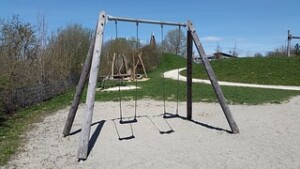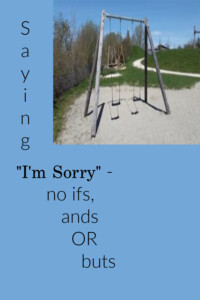How to Say “I’m Sorry” – No Ifs, Ands, or Buts
Sorry, not sorry.
Saying “I’m sorry” can be so hard to do.
It was late Sunday afternoon and the sisters on the playground had been having a great time. One of them did something to upset the other one. Each of them wanted to tell me what the other one had done wrong, and neither was anxious to confess her own wrongdoing. The gentle playground scene changed instantly when the squabble began, and the swings and climbing bars were disbanded because of their rift.
They came to me, each one expecting me to side with her. I pulled out my tricks of years ago and had them both sit in time-out for five minutes. Each one had to contemplate her own wrongdoing and be ready to tell me that first. How much easier it was for each girl to squeal on the other rather than admit what she had done wrong!

It’s in our genetics, and all of us have inherited this gene. I’ve never known a person who thinks it’s easy to ask forgiveness or to admit that they have been wrong.
Sometimes children need adults to help them figure out what they have done wrong. And sometimes, as adults, God uses situations and circumstances to help us figure out where we have been wrong. God has a way of bringing us to our senses.
Jesus tells us how to say “I’m Sorry” in a story
Jesus told the story we know as “The Prodigal Son” to his disciples and others who were listening. Now I know a parable is just a story, and this parable probably wasn’t based on real people, but it could have been. Jesus took a real-to-life situation in the culture of His day, and He used that story to tell not only about a father’s love, but also the correct way to ask forgiveness when we have been wrong.
Since this was a parable, I know that Jesus could give the story any twist He wanted. He chose the outcome of the story for a purpose. One of those purposes was to show how a person ought to go about asking forgiveness.
The prodigal son
But first, the fascinating story, which you can find in Luke 15:11-32.
Here is a father who has two sons and a bunch of servants. The older son appears to be a good worker and stays focused on the task at hand. The younger son; however, is restless and tired of life on the farm. He decides he is done with this kind of living and asks for his share of the inheritance.
We don’t know a thing about the home life or the dynamics of relationships inside that home. One could assume that the older son was a typical firstborn bossy brother, and the younger son was the spoiled little brother. We do know that the younger son came to his father one day and asked for his share of the inheritance.
He got it, then he left.
Scripture says, “. . . not soon after, he left home.”
We don’t know how long he was gone, but we do know a few things about his life after he left. He did some riotous living. He spent his money, all of it. There was a famine in the land.
The son was suddenly in want. His father was not nearby; his money (and we assume his friends) were gone. He became a hired hand because, after all, he needed money to live.
The reckoning
The farmer who hired him sent him out to feed the pigs. While feeding slop to the pigs, the younger son became so hungry that he considered eating the husks from the corn he was feeding those pigs. He had that “aha” moment. He came to his senses. It looked like Time-Out, for him, had accomplished its purpose.
The son realized how far he had come from where he once was. Once the son of a man of wealth, a man who had servants, he, the son, was now a servant.
This son shows us how to admit a wrong, how to ask forgiveness, and how to make restitution. He shows us how to say “I’m sorry.”
Sitting there among the pigs with their slop, he made a decision.
How ridiculous this is, he told himself. My father’s servants are treated better and are eating better than I am. I will go back, and I will ask to come back home as a servant. I’m going home, and this is what I’m going to say to my father: “I have sinned, and I’m not even worthy to become your son. Please just let me be one of your hired servants.”
Coming home
He made the trip back home. His father rushed out to meet him with arms opened wide. This did not stop the son from his agenda. He said exactly what he planned to say.
The son admitted his wrong: “I have sinned against Heaven and against you.”
He acknowledged where his wrong had taken him and what he had lost: “I am not worthy . . . ”
The prodigal realized fully what he deserved because of his choices: “I don’t even deserve being your son.”
He recognized what he lost because of his choices: “Just make me one of your hired servants.”
Sloppy “I’m sorry” ways
 So often, in our sloppy attempts at apologizing, we shift the focus from our wrongdoing to the other person’s – just like the sisters on the playground. We choose words that aren’t really an apology, but rather a way of excusing our behavior.
So often, in our sloppy attempts at apologizing, we shift the focus from our wrongdoing to the other person’s – just like the sisters on the playground. We choose words that aren’t really an apology, but rather a way of excusing our behavior.
While it may seem like we are apologizing, our words are empty because they are not sincere and genuine. This prodigal son didn’t do that.
While we might criticize the son for leaving home like he did, we can also recognize what he did right once he came to his senses.
What the son did right
- He did not blame anyone else. He focused on and admitted his sin rather than dwelling on anyone else’s. The prodigal did not say, “I’m sorry BUT if you hadn’t done so-and-so, I wouldn’t have. . .” Or, like one of the playground sisters said to me, “Well, she gave me the fist first, so . . . “
- The son did not minimize the pain he caused or imply the other party was too sensitive. He did not say, “I’m sorry IF I hurt you . . .”
- The youngest son admitted what he did was wrong. He did not imply, “It wasn’t a big deal.”
- The prodigal took responsibility for his wrongdoing and did not shove it off onto the other person. Nor did he say, “You’re just too sensitive.”
- He did not blame his past. Nor did he complain, “I had such a lousy home life.”
He made the trip home.
 His father was waiting for him; he saw him and ran to meet him.
His father was waiting for him; he saw him and ran to meet him.
And the son stepped up to the plate and acknowledged his wrong. He said exactly what he planned to say before he made that long trip home.
The joy of his father at his return did not negate his responsibility for what he had done.
Jesus’ purpose in the story
I’m not sure exactly why Jesus told this parable. I’m pretty sure one of the reasons was to show us the love of our Heavenly Father, because this parable follows two others that talk about being lost – and being found.
Jesus preceded this story with a discourse on the cost of discipleship, the merit of salt, and the lack of flavor when salt has lost its saltiness. Part of being a true disciple of Jesus is living like He has asked us to live and having such flavor in our lives that it makes others thirsty for Jesus.
If we don’t do that, He says, we can’t be His disciples.
“Oh, and by the way, when you’ve failed at being a disciple; when you have lost your saltiness, this is how you make it right,” He says.
More of the story
There’s more to the story here.
There is the negative response of the older brother who stayed at home and helped keep the family estate running; there is his rejection of the joy and the party that is thrown when his younger brother was reinstated by their father.
Life doesn’t guarantee reinstatement after a confession of wrongdoing. Yet, there is guaranteed reinstatement with Jesus, even if we don’t receive it from family members or those whom we have wronged.
A plan for saying “I’m sorry”
The part I love best about this story is the lessons I learned from this son whose eyes were opened in that pigpen somewhere in another country away from his family. His decision to go back home and his clear plan for asking forgiveness leave me with a guide for the times I have failed and been wrong.
Suppose the person you’ve wronged isn’t near you? Ask God to help you find a way. Plan what you’ll say so that when God puts that person in your path, you’ll be ready. I know this plan works because I’ve experienced it myself.
Whether we’re adults or children, it’s never easy to ask forgiveness. But having a plan makes taking that first step so much easier.
That evening on the playground, the sisters took turns admitting what they had done wrong. “I am sorry for hitting you,” one said. “It was wrong of me. Will you forgive me?”
There will be more spats down the road when they’ll need to apologize to each other again, just like the rest of us do as adults.
When I’m tempted to ignore the nudge of the Spirit to make things right, I remember the lessons I’ve learned from the once-prodigal son:
- Admit my wrong.
- Acknowledge the pain.
- Ask forgiveness.
When I follow the pattern set out for me by this once-lost son, I, too, can be reinstated. I can also experience the wonder of a restored relationship. And I, like the prodigal son, can know the wholeness of a conscience that is clear and clean. And so can you!

This post is a re-post from over five years ago. Sometimes I go back and read it myself. You might want to read it again as well. 🙂
Photo attribution: Pixabay.com












